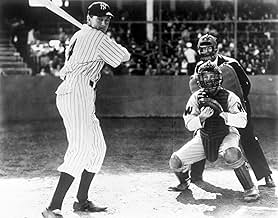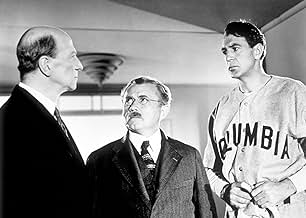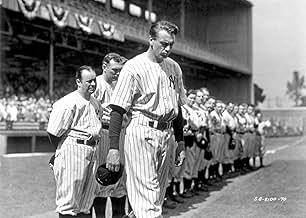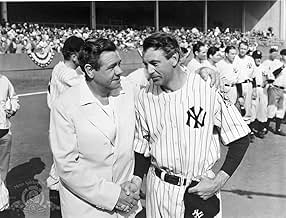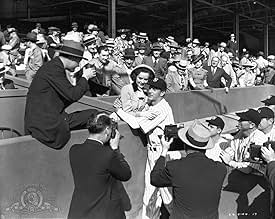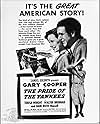IMDb-BEWERTUNG
7,6/10
12.617
IHRE BEWERTUNG
Die Geschichte über das Leben und die Karriere des berühmten Baseballspielers Lou Gehrig.Die Geschichte über das Leben und die Karriere des berühmten Baseballspielers Lou Gehrig.Die Geschichte über das Leben und die Karriere des berühmten Baseballspielers Lou Gehrig.
- 1 Oscar gewonnen
- 5 Gewinne & 10 Nominierungen insgesamt
Ludwig Stössel
- Pop Gehrig
- (as Ludwig Stossel)
Bob Meusel
- Robert W. Meusel
- (as Robert W. Meusel)
Empfohlene Bewertungen
A touching and emotional experience about the life of late-New York Yankees first baseman Lou Gehrig (played brilliantly by the always excellent Gary Cooper, Oscar-nominated). By 1939 Gehrig was saying farewell to baseball prematurely due to a rare muscle disorder that today bears the hero's name. Shortly after Gehrig's famous speech, he would indeed pass away. "The Pride of the Yankees" (made less than three years after his death) is a moving tribute that is first-class in every way imaginable. We meet the character as a young boy whose strict mother wants him to be an engineer. As the years pass though he cannot deny his love of the grand old game. Sportswriter Walter Brennan (who was always outstanding as well) becomes the biggest supporter of Gehrig, even though Gehrig seems out-of-place in the big city at times and seems more concerned about baseball than anything else (which bothers some inside of the Yankees circle, mainly due to Babe Ruth's famous antics). As the years pass, championships come and a constant is always Gehrig who set a record with 2,130 consecutive games played (Cal Ripken, Jr. would later break that record in 1995). He finds love with a young woman from Chicago (Oscar-nominee Teresa Wright) and it appears that happiness is all that the couple will experience. Sadly that would not be the case though. Sam Wood's heart-felt direction and a focused screenplay (which is a bit sappy at times) just add an odd element of grace that endears the film to most all movie-goers. Babe Ruth does play himself here and is a surprisingly excellent performer who allows himself to be taken out of the spotlight to tell Gehrig's story. He ends up being a really solid supporting actor. I do admit that "The Pride of the Yankees" is slightly flawed. Some things seem a bit staged (most notably the young child in the hospital), but overall the film is right on target. Anyone who loves baseball, loves movies and has feelings (whether good, bad or indifferent) about the Yankees should definitely give "The Pride of the Yankees" an at-bat. It is a stunning experience that is suitable for the whole family and teaches the whole audience about love, friendship, compassion, life, death and heroism. 4.5 out of 5 stars.
Pride of the Yankees is still the greatest baseball movie ever made. It is the true story of the legendary Lou Gehrig, the "iron man" of baseball who was struck down suddenly by what whould later be known as Lou Gehrig's disease. Sterling performances by Cooper and a talented cast which included Thresa Wright, Walter Brennan,Dan Duryea and a guest appearance by Babe Ruth himself. There are many touching scenes in this film, especially the last one in which Gehrig says goodbye to his fans and team-mates at a tribute in Yankee Stadium. Try to rent the black and white original version. You won't be sorry!
The only reason I don't give this film a perfect 10 is that I think Gary Cooper was a bit too old to be playing Lou Gehrig as a youth. Cooper was 41 when Pride of the Yankees was made. He was two years older than Lou Gehrig actually was.
While not terribly convincing as a college age Gehrig at Columbia University, the part of Gehrig grew into Cooper as Gehrig aged cinematically. And of course his recreation of Lou Gehrig's farewell to baseball got him an Oscar nomination.
Henry Louis Gehrig, child of German immigrants who grew up in the Yorkville section of Manhattan, was arguably the greatest first baseman baseball has ever known. He certainly has very few competitors for the honor. His famous record of 2130 consecutive games was bettered about a decade ago by Cal Ripken, but he still holds the major league record for lifetime grand-slam home runs, 23 and the American League RBI record for a single season, 184. He is one of a select group of ballplayers to have won the Triple Crown, he did that in 1934. His lifetime batting average of .340 is only topped by a handful.
He was as writer Frank Graham put it, baseball's "quiet hero." Until he was forced from baseball by the disease he gave his name to Gehrig played second fiddle to the flamboyant Babe Ruth and then to a graceful rookie named Joe DiMaggio.
The facts of Gehrig's life are somewhat jumbled in this film for dramatic coherency, but the essence of his character is brought out in the script by Paul Gallico. In fact Gallico wrote himself into the film as sportswriter Sam Blake as played by Walter Brennan.
Gary Cooper and Lou Gehrig and Teresa Wright as Eleanor Twitchell Gehrig both received Oscar nominations for their portrayals.
It should also not be forgotten that Lou Gehrig was a German American and I believe one of the reasons the film was made was that at that time we were fighting Germany. The German American Bund had its following and very much so in Lou Gehrig's Yorkville neighborhood. German Americans certainly had other and better role models than the Bund.
I remember as a lad going to Yankee old-timers games and there was always a moment of reverential silence when the Yankee widows, Claire Hodgson Ruth and Eleanor Twitchell Gehrig were always introduced. Both survived their husbands by many years.
In fact when Teresa Wright died this past year when the roll call of former Yankees who had passed on her name was read out among all the ballplayers. It was a fitting tribute to a great actress and a woman who didn't know a thing about baseball before she did this film, but became a devoted fan afterward. I guess that was her private tribute to Lou Gehrig.
There is still no cure for amytrophic lateral sclerosis or now known as Lou Gehrig's Disease. A lot of other noted persons have passed on from it, Jacob Javits, David Niven, Ezzard Charles, Dennis Day and former Vice President Henry A. Wallace. Still we can hope for a dedicated and inspired scientist to find a cure.
Until then we have this inspirational movie and Lou Gehrig's inspired and remembered life.
While not terribly convincing as a college age Gehrig at Columbia University, the part of Gehrig grew into Cooper as Gehrig aged cinematically. And of course his recreation of Lou Gehrig's farewell to baseball got him an Oscar nomination.
Henry Louis Gehrig, child of German immigrants who grew up in the Yorkville section of Manhattan, was arguably the greatest first baseman baseball has ever known. He certainly has very few competitors for the honor. His famous record of 2130 consecutive games was bettered about a decade ago by Cal Ripken, but he still holds the major league record for lifetime grand-slam home runs, 23 and the American League RBI record for a single season, 184. He is one of a select group of ballplayers to have won the Triple Crown, he did that in 1934. His lifetime batting average of .340 is only topped by a handful.
He was as writer Frank Graham put it, baseball's "quiet hero." Until he was forced from baseball by the disease he gave his name to Gehrig played second fiddle to the flamboyant Babe Ruth and then to a graceful rookie named Joe DiMaggio.
The facts of Gehrig's life are somewhat jumbled in this film for dramatic coherency, but the essence of his character is brought out in the script by Paul Gallico. In fact Gallico wrote himself into the film as sportswriter Sam Blake as played by Walter Brennan.
Gary Cooper and Lou Gehrig and Teresa Wright as Eleanor Twitchell Gehrig both received Oscar nominations for their portrayals.
It should also not be forgotten that Lou Gehrig was a German American and I believe one of the reasons the film was made was that at that time we were fighting Germany. The German American Bund had its following and very much so in Lou Gehrig's Yorkville neighborhood. German Americans certainly had other and better role models than the Bund.
I remember as a lad going to Yankee old-timers games and there was always a moment of reverential silence when the Yankee widows, Claire Hodgson Ruth and Eleanor Twitchell Gehrig were always introduced. Both survived their husbands by many years.
In fact when Teresa Wright died this past year when the roll call of former Yankees who had passed on her name was read out among all the ballplayers. It was a fitting tribute to a great actress and a woman who didn't know a thing about baseball before she did this film, but became a devoted fan afterward. I guess that was her private tribute to Lou Gehrig.
There is still no cure for amytrophic lateral sclerosis or now known as Lou Gehrig's Disease. A lot of other noted persons have passed on from it, Jacob Javits, David Niven, Ezzard Charles, Dennis Day and former Vice President Henry A. Wallace. Still we can hope for a dedicated and inspired scientist to find a cure.
Until then we have this inspirational movie and Lou Gehrig's inspired and remembered life.
Gary Cooper may have won his Oscar for SERGEANT YORK--but I think he deserved it even more for PRIDE OF THE YANKEES. I've never seen him give a more heartfelt, natural and completely likeable performance than I have here. And Teresa Wright is glowing as his sweetheart.
It tells Lou Gehrig's story in a simple, straightforward manner with only an occasional bit of Hollywood corn, the kind so typical of the 1940s. But the main storyline is carried by Cooper and Wright with some great assist from Walter Brennan. Brennan drops a lot of his cornball mannerisms (the kind he uses he in all his Western roles) and plays it straight here--with excellent results.
But it's Cooper's achievement--no doubt about that. If the last twenty minutes of the film don't move you to tears, you're made of stone. Cooper gets across the panic and fear that hits him with the first signs of his illness--with a subtle show of facial expressions. He's really into his character here and gives one of the best performances of his career.
Knowing someone who died from this disease, I was especially moved at how the first signs of illness were shown here.
Douglas Croft does a fine job as the young Lou--and by the way, whatever happened to him? He played Ronald Reagan as a boy in KINGS ROW and did several other films in the '40s. And how come Dane Clark received no billing in the credits? He was only seen early on in the film but he had a line of dialogue as one of Lou's fraternity pals. He had no credit in Alan Ladd's THE GLASS KEY too--he's the man Brian Donlevy shoves through a plate glass window. A year later he was being given the star buildup at Warner Bros.
A great film and a wonderful tribute to Lou Gehrig.
It tells Lou Gehrig's story in a simple, straightforward manner with only an occasional bit of Hollywood corn, the kind so typical of the 1940s. But the main storyline is carried by Cooper and Wright with some great assist from Walter Brennan. Brennan drops a lot of his cornball mannerisms (the kind he uses he in all his Western roles) and plays it straight here--with excellent results.
But it's Cooper's achievement--no doubt about that. If the last twenty minutes of the film don't move you to tears, you're made of stone. Cooper gets across the panic and fear that hits him with the first signs of his illness--with a subtle show of facial expressions. He's really into his character here and gives one of the best performances of his career.
Knowing someone who died from this disease, I was especially moved at how the first signs of illness were shown here.
Douglas Croft does a fine job as the young Lou--and by the way, whatever happened to him? He played Ronald Reagan as a boy in KINGS ROW and did several other films in the '40s. And how come Dane Clark received no billing in the credits? He was only seen early on in the film but he had a line of dialogue as one of Lou's fraternity pals. He had no credit in Alan Ladd's THE GLASS KEY too--he's the man Brian Donlevy shoves through a plate glass window. A year later he was being given the star buildup at Warner Bros.
A great film and a wonderful tribute to Lou Gehrig.
Being a lifelong Yankee fan this movie is my all time favorite. At times it can be a bit "hokey", but that is part of the charm. Even though you know the eventual fate of Lou Gehrig you cant help feeling that somehow he would get better.
My favorite scene was after his marriage to Eleanor and they were in the car driven by Walter Brennan heading to Yankee Stadium. When the motorcycle cop pulled them over for speeding. It was so "campy" but I loved it.
This movie hit all the emotions you can have! I dare anyone to tell me that after his farewell at Yankee Stadium they didn't get a lump in their throat.
My favorite scene was after his marriage to Eleanor and they were in the car driven by Walter Brennan heading to Yankee Stadium. When the motorcycle cop pulled them over for speeding. It was so "campy" but I loved it.
This movie hit all the emotions you can have! I dare anyone to tell me that after his farewell at Yankee Stadium they didn't get a lump in their throat.
Wusstest du schon
- WissenswertesReleased just 17 months after Lou Gehrig's death.
- PatzerAs Gehrig (Cooper) is doing his homework at Columbia, he writes with his right hand. Whilst Gehrig batted and threw left-handed, like many lefties of the era (perhaps because of "correction" in school), he wrote with his right hand.
- Zitate
[last lines]
Lou Gehrig: [his farewell speech]
Lou Gehrig: Today, I consider myself the luckiest man on the face of the earth... play ball!
- Crazy CreditsOpening credits acknowledgment: Appreciation is expressed for the gracious assistance of Eleanor Gehrig (as Mrs. Lou Gehrig) and for the cooperation of Ed Barrow (as Mr. Ed Barrow) and the New York Yankees arranged by Christy Walsh.
- Alternative VersionenA colorized version is available.
- VerbindungenFeatured in Diamonds on the Silver Screen (1992)
- SoundtracksTake Me Out to the Ball Game
(1908) (uncredited)
Music by Albert von Tilzer
Played during the opening credits and often in the score
Top-Auswahl
Melde dich zum Bewerten an und greife auf die Watchlist für personalisierte Empfehlungen zu.
Details
- Erscheinungsdatum
- Herkunftsland
- Sprache
- Auch bekannt als
- Idolo, amante y héroe
- Drehorte
- Produktionsfirma
- Weitere beteiligte Unternehmen bei IMDbPro anzeigen
- Laufzeit
- 1 Std. 27 Min.(87 min)
- Farbe
- Seitenverhältnis
- 1.37 : 1
Zu dieser Seite beitragen
Bearbeitung vorschlagen oder fehlenden Inhalt hinzufügen


